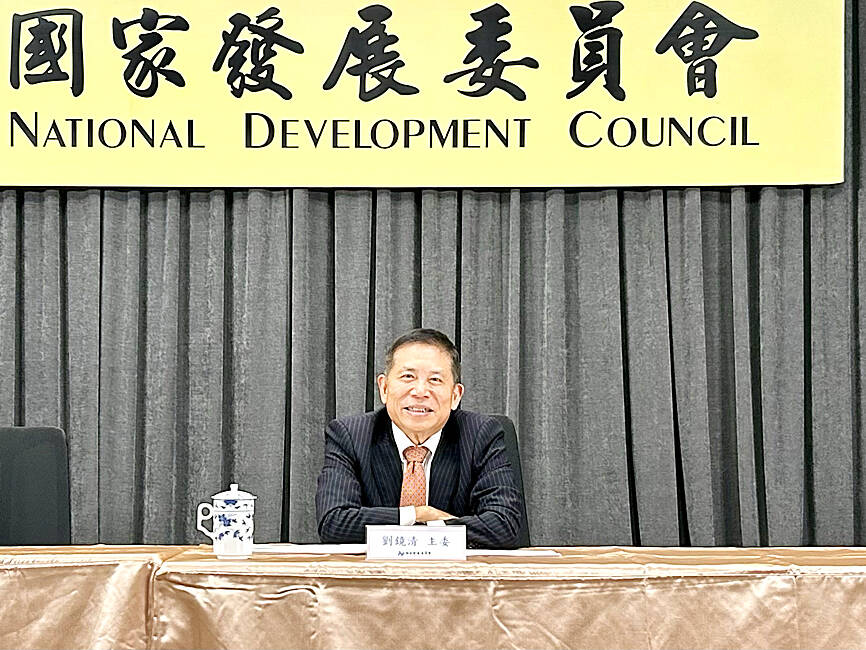The National Development Council (NDC) yesterday unveiled its four-year economic development plan, which aims to achieve GDP growth of between 2.8 percent and 3.6 percent, and increase GDP per capita from US$39,105 to US$42,787.
NDC Minister Paul Liu (劉鏡清) unveiled the policy goal at a news conference in Taipei after the Cabinet gave its approval.
“The projected economic growth during 2025 to 2028 is doable and pragmatic, as it falls within the 10-year average,” Liu said.

Photo: Wu Hsin-tien, Taipei Times
Taiwan’s economy is expected to grow 3.9 percent this year, the second-highest in 10 years, thanks to a rush by US technology giants to develop artificial intelligence (AI) services and applications, he said.
Taiwan is home to the world’s major suppliers of AI chips and servers.
Private investment, a growth drag in recent years, could exceed NT$5 trillion (US$154.79 billion) this year for the second time on record and the momentum would continue into next year, given strong imports of capital equipment and input materials, Liu said.
At the same time, the government would lend support by pouring money into infrastructure projects and the development of green energy sources, making the 3.9 percent GDP growth plan achievable and practical, the minister said.
If things proceed smoothly, Taiwan would overtake Japan in terms of GDP per capita this year, South Korea next year and catch up with Israel in the future, Liu said.
Additionally, the council aims to achieve unemployment rates of between 3.2 percent and 3.5 percent in the coming four years, with the core consumer price index (CPI) expected to be below the central bank’s 2 percent target, he said.
Core CPI is a more reliable long-term price tracker because it excludes volatile items including vegetables and oil products, has returned to the 2 percent territory for four consecutive months, versus an average headline CPI of 2.3 percent in the first seven months of this year, government data showed.
Liu said he is upbeat that GDP per capita would surpass US$40,000 in 2027 and headline GDP would approach US$1 trillion in 2028.
That would be helped by Taiwan’s semiconductor leadership positions that make the industry indispensable in global technology supply chains, he said.
Against this backdrop, AI production value could reach NT$1 trillion in 2026, while satellite communications could generate NT$30 billion and military drones yield another NT$30 billion, the minister said.
NDC Deputy Minister Kao Shien-quey (高仙桂) said the government has observed an imbalanced development between the semiconductor industry and other sectors and it is working to create a more sustainable balance by placing more emphasis on social investment.

WEAKER ACTIVITY: The sharpest deterioration was seen in the electronics and optical components sector, with the production index falling 13.2 points to 44.5 Taiwan’s manufacturing sector last month contracted for a second consecutive month, with the purchasing managers’ index (PMI) slipping to 48, reflecting ongoing caution over trade uncertainties, the Chung-Hua Institution for Economic Research (CIER, 中華經濟研究院) said yesterday. The decline reflects growing caution among companies amid uncertainty surrounding US tariffs, semiconductor duties and automotive import levies, and it is also likely linked to fading front-loading activity, CIER president Lien Hsien-ming (連賢明) said. “Some clients have started shifting orders to Southeast Asian countries where tariff regimes are already clear,” Lien told a news conference. Firms across the supply chain are also lowering stock levels to mitigate

IN THE AIR: While most companies said they were committed to North American operations, some added that production and costs would depend on the outcome of a US trade probe Leading local contract electronics makers Wistron Corp (緯創), Quanta Computer Inc (廣達), Inventec Corp (英業達) and Compal Electronics Inc (仁寶) are to maintain their North American expansion plans, despite Washington’s 20 percent tariff on Taiwanese goods. Wistron said it has long maintained a presence in the US, while distributing production across Taiwan, North America, Southeast Asia and Europe. The company is in talks with customers to align capacity with their site preferences, a company official told the Taipei Times by telephone on Friday. The company is still in talks with clients over who would bear the tariff costs, with the outcome pending further

Six Taiwanese companies, including contract chipmaker Taiwan Semiconductor Manufacturing Co (TSMC, 台積電), made the 2025 Fortune Global 500 list of the world’s largest firms by revenue. In a report published by New York-based Fortune magazine on Tuesday, Hon Hai Precision Industry Co (鴻海精密), also known as Foxconn Technology Group (富士康科技集團), ranked highest among Taiwanese firms, placing 28th with revenue of US$213.69 billion. Up 60 spots from last year, TSMC rose to No. 126 with US$90.16 billion in revenue, followed by Quanta Computer Inc (廣達) at 348th, Pegatron Corp (和碩) at 461st, CPC Corp, Taiwan (台灣中油) at 494th and Wistron Corp (緯創) at

NEGOTIATIONS: Semiconductors play an outsized role in Taiwan’s industrial and economic development and are a major driver of the Taiwan-US trade imbalance With US President Donald Trump threatening to impose tariffs on semiconductors, Taiwan is expected to face a significant challenge, as information and communications technology (ICT) products account for more than 70 percent of its exports to the US, Chung-Hua Institution for Economic Research (CIER, 中華經濟研究院) president Lien Hsien-ming (連賢明) said on Friday. Compared with other countries, semiconductors play a disproportionately large role in Taiwan’s industrial and economic development, Lien said. As the sixth-largest contributor to the US trade deficit, Taiwan recorded a US$73.9 billion trade surplus with the US last year — up from US$47.8 billion in 2023 — driven by strong